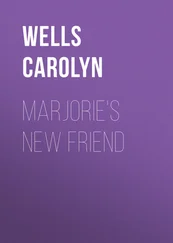H. Wells - THE NEW MACHIAVELLI
Здесь есть возможность читать онлайн «H. Wells - THE NEW MACHIAVELLI» весь текст электронной книги совершенно бесплатно (целиком полную версию без сокращений). В некоторых случаях можно слушать аудио, скачать через торрент в формате fb2 и присутствует краткое содержание. Жанр: Классическая проза, на английском языке. Описание произведения, (предисловие) а так же отзывы посетителей доступны на портале библиотеки ЛибКат.
- Название:THE NEW MACHIAVELLI
- Автор:
- Жанр:
- Год:неизвестен
- ISBN:нет данных
- Рейтинг книги:5 / 5. Голосов: 1
-
Избранное:Добавить в избранное
- Отзывы:
-
Ваша оценка:
- 100
- 1
- 2
- 3
- 4
- 5
THE NEW MACHIAVELLI: краткое содержание, описание и аннотация
Предлагаем к чтению аннотацию, описание, краткое содержание или предисловие (зависит от того, что написал сам автор книги «THE NEW MACHIAVELLI»). Если вы не нашли необходимую информацию о книге — напишите в комментариях, мы постараемся отыскать её.
THE NEW MACHIAVELLI — читать онлайн бесплатно полную книгу (весь текст) целиком
Ниже представлен текст книги, разбитый по страницам. Система сохранения места последней прочитанной страницы, позволяет с удобством читать онлайн бесплатно книгу «THE NEW MACHIAVELLI», без необходимости каждый раз заново искать на чём Вы остановились. Поставьте закладку, и сможете в любой момент перейти на страницу, на которой закончили чтение.
Интервал:
Закладка:
borrowed one from the plumber who mixed his paint-and he had in his
own happy-go-lucky way contrived a combination of the garden fruit
ladder with a battered kitchen table that served all sorts of odd
purposes in an outhouse. He had stayed up this arrangement by means
of the garden roller, and the roller had at the critical moment-
rolled. He was lying close by the garden door with his head queerly
bent back against a broken and twisted rainwater pipe, an expression
of pacific contentment on his face, a bamboo curtain rod with a
tableknife tied to end of it, still gripped in his hand. We had
been rapping for some time at the front door unable to make him
hear, and then we came round by the door in the side trellis into
the garden and so discovered him.
"Arthur!" I remembermy mother crying with the strangest break in
her voice, "What are you doing there? Arthur! And-SUNDAY!"
I was coming behind her, musing remotely, when the quality of her
voice roused me. She stood as if she could not go near him. He had
always puzzled her so, he and his ways, and this seemed only another
enigma. Then the truthdawned on her, she shrieked as if afraid of
him, ran a dozen steps back towards the trellis door and stopped and
clasped her ineffectual gloved hands, leaving me staring blankly,
too astonished for feeling, at the carelessly flung limbs.
The same idea came to me also. I ran to her. "Mother!" I cried,
pale to the depths of my spirit, "IS HE DEAD?"
I had been thinkingtwo minutes before of the cold fruit pie that
glorified our Sunday dinner-table, and how I might perhaps get into
the tree at the end of the garden to read in the afternoon. Now an
immense fact had come down like a curtain and blotted out all my
childish world. My father was lying dead before my eyes… I
perceivedthat my mother was helpless and that things must he done.
"Mother!" I said, "we must get Doctor Beaseley,-and carry him
indoors."
CHAPTER THE THIRD
SCHOLASTIC
1
My formal education began in a small preparatory school in
Bromstead. I went there as a day boy. The charge for my
instruction was mainly set off by the periodic visits of my father
with a large bag of battered fossils to lecture to us upon geology.
I was one of those fortunate youngsters who take readily to school
work, I had a good memory, versatile interests and a considerable
appetite for commendation, and when I was barely twelve I got a
scholarship at the City Merchants School and was entrusted with a
scholar's railway season ticket to Victoria. After my father's
death a large and very animated and solidly built uncle in tweeds
from Staffordshire, Uncle Minter, my mother's sister's husband, with
a remarkable accent and remarkable vowel sounds, who had plunged
into the Bromstead home once or twice for the night but who was
otherwise unknown to me, came on the scene, sold off the three gaunt
houses with the utmost gusto, invested the proceeds and my father's
life insurance money, and got us into a small villa at Penge within
sightof that immense facade of glass and iron, the Crystal Palace.
Then he retired in a mood of good-naturedcontempt to his native
habitat again. We stayed at Penge until my mother's death.
School became a large part of the world to me, absorbing my time and
interest, and I never acquired that detailed and intimate knowledge
of Penge and the hilly villadom round about, that I have of the town
and outskirts of Bromstead.
It was a district of very much the same character, but it was more
completely urbanised and nearer to the centre of things; there were
the same unfinished roads, the same occasional disconcerted hedges
and trees, the same butcher's horse grazing under a builder's
notice-board, the same incidental lapses into slum. The Crystal
Palace grounds cut off a large part of my walking radius to the west
with impassable fences and forbiddingly expensive turnstiles, but it
added to the ordinary spectacle of meteorology a great variety of
gratuitous fireworks which banged and flared away of a night after
supper and drew me abroad to seethem better. Such walks as I took,
to Croydon, Wembledon, West Wickham and Greenwich, impressed upon me
the interminable extent of London's residential suburbs; mile after
mile one went, between houses, villas, rows of cottages, streets of
shops, under railway arches, over railway bridges. I have forgotten
the detailed local characteristics-if there were any-of much of
that region altogether. I was only there two years, and half my
perambulations occurred at dusk or after dark. But with Penge I
associate my first realisations of the wonder and beauty of twilight
and night, the effectof dark walls reflecting lamplight, and the
mystery of blue haze-veiled hillsides of houses, the glare of shops
by night, the glowing steam and streaming sparks of railway trains
and railway signals lit up in the darkness. My first rambles in the
evening occurred at Penge-I was becoming a big and independent-
spiritedboy-and I began my experienceof smoking during these
twilight prowls with the threepenny packets of American cigarettes
then just appearing in the world.
My life centred upon the City Merchants School. Usually I caught
the eight-eighteen for Victoria, I had a midday meal and tea; four
nights a week I stayed for preparation, and often I was not back
home again until within an hour of my bedtime. I spent my half
holidays at school in order to play cricket and football. This, and
a pretty voracious appetite for miscellaneous reading which was
fostered by the Penge Middleton Library, did not leave me much
leisure for local topography. On Sundays also I sang in the choir
at St. Martin 's Church, and my mother did not like me to walk out
aloneon the Sabbath afternoon, she herselfslumbered, so that I
wrote or read at home. I must confess I was at home as little as I
could contrive.
Home, after my father's death, had become a very quietand
uneventful place indeed. My mother had either an unimaginative
temperament or her mindwas greatly occupied with private religious
solicitudes, and I rememberher talking to me but little, and that
usually upon topics I was anxious to evade. I had developed my own
view about low-Church theology long before my father's death, and my
meditationupon that event had finished my secret estrangement from
my mother's faith. My reason would not permit even a remote chance
of his beingin hell, he was so manifestly not evil, and this
religion would not permit him a remote chance of beingout yet.
When I was a little boy my mother had taught me to read and write
and pray and had done many things for me, indeed she persisted in
washing me and even in making my clothes until I rebelled against
these things as indignities. But our mindsparted very soon. She
never began to understandthe mental processes of my play, she never
interested herselfin my school life and work, she could not
understandthings I said; and she came, I think, quite insensibly to
regard me with something of the same hopeless perplexity she had
felttowards my father.
Him she must have wedded under considerable delusions. I do not
thinkhe deceivedher, indeed, nor do I suspect him of mercenariness
in their union; but no doubthe played up to her requirements in the
half ingenuous way that was and still is the quality of most wooing,
Читать дальшеИнтервал:
Закладка:
Похожие книги на «THE NEW MACHIAVELLI»
Представляем Вашему вниманию похожие книги на «THE NEW MACHIAVELLI» списком для выбора. Мы отобрали схожую по названию и смыслу литературу в надежде предоставить читателям больше вариантов отыскать новые, интересные, ещё непрочитанные произведения.
Обсуждение, отзывы о книге «THE NEW MACHIAVELLI» и просто собственные мнения читателей. Оставьте ваши комментарии, напишите, что Вы думаете о произведении, его смысле или главных героях. Укажите что конкретно понравилось, а что нет, и почему Вы так считаете.










